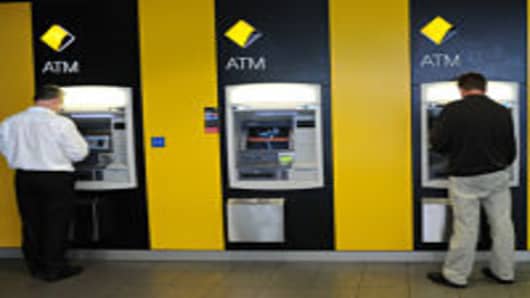CBA said loan impairment expenses were down 25 percent and tier I capital, a measure of the bank's ability to absorb losses, was at 9.9 percent at December 31. Net interest margins were down 10 basis points on the prior half, to 2.15 percent.
"The margin was a bit lower than expected. They have been saying margins were not too bad previously. The declared number is an average for the first half, it would be interesting to see how the margin run rate was towards the end," said Rohan Walsh, a fund manager at Karara Capital.
"For the current half, CBA has got external and internal pressures from rising funding cost and higher liquid holdings, which will continue to exert pressure. One needs to wait and see how they can tackle it," he added.
Commonwealth Bank's cash profit in the six months to December 2011 rose to A$3.576 billion ($3.82 billion) from A$3.335 billion reported a year ago, and compared with analysts' forecasts of A$3.54 billion.
Cash profit, which excludes one-offs and non-cash accounting items, is closely watched by investors.
Earlier this week CBA raised variable mortgage rates by 10 basis points, citing rising funding costs, joining its three main rivals in breaking the practice of only moving on rates when the central bank changed its cash rate.
"Deposit funding has gone by 12 basis points and wholesale funding cost has gone by 45 basis points in the period (since June), so the weighted average cost has gone up by 25 basis points. We have recovered 10," CBA Chief Financial Officer David Craig said.
"It is very difficult to make money on home loans," he added.
CEO Ian Narev said the fundamentals of the Australian economy remained strong and the bank was confident in the country's prospects.
"However, in the absence of sustained recovery in offshore economies, particularly Europe, businesses and consumers will remain cautious, and the current trend of weak credit growth, asset allocation towards cash, and volatile markets will continue in Australia," he said in a statement, adding that funding costs would continue to rise.
No Job Cuts
CBA said there were no plans for major redundancy programs or to send jobs offshore, bucking a trend by other major lenders to cut or move jobs as a way to rein in costs and protect profits.
On Monday, ANZ said it would slash 1,000 jobs in Australia this year.
In the last fiscal year, CBA and its three main rivals together made a record $25 billion in profits as a booming resources sector helped the Australian economy sail through the global economic downturn relatively unscathed compared with peers in Europe and the United States.
But credit growth has fallen to the lowest level since the 1970s as households look to increase savings and corporates pay down debt.
The rising cost of funds, thanks to the instability in Europe, and falling loan demand are crimping profit growth and pushing banks to cut costs in order to maintain earnings growth.
The top four banks raise about $100 billion annually from wholesale debt markets, primarily from Europe and the United States.
Reserve Bank of Australia assistant governor Guy Debelle said on Tuesday that while funding costs were placing pressure on Aussie banks there has been an improvement recently as markets improved.
CBA shares have risen 1.5 percent so far this year, the second-worst performer among the big four banks. Compared with that, the S&P/ASX 200 benchmark index has risen 4.6 percent year-to-date.
Shares opened 0.7 percent higher after the results.


